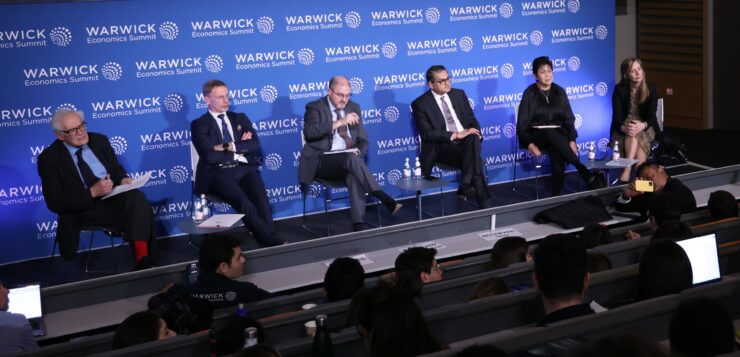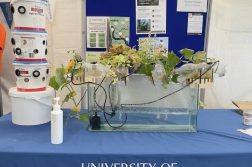Covering topics from AI to veganism, the Warwick Economics Summit provided for a range of interests beyond interest rates.
For those of us who do not study the subject, the words ‘economics summit’ likely conjure up images of confusing graphs and endless acronyms. Not so for the 23rd Warwick Economics Summit, held last weekend from the 2nd – 4th February.
While there were some of these, this years’ conference, hosted at the University of Warwick’s campus, had something for everyone. Events ranged from panel discussions on sustainable proteins to careers seminars with the EU parliament. Particularly impressive, however, was the guest speaker list. Not only had Europe’s largest student-led conference attracted an international audience from over 32 different universities, but also key-note speakers including the presidents of Timor-Leste and the Central Tibetan Administration, the former head of the European Central Bank, and the Director-General of the World Health Organisation.
Preaching peace
Perhaps unsurprisingly given the release of Christopher Nolan’s film Oppenheimer last year, the speech by the leader of ICAN (the International Campaign to Abolish Nuclear Weapons), Melissa Parke, on the need for nuclear disarmament resonated with numerous students.
Highlighting the “suicidal” impacts a nuclear war would have, Ms. Parke was keen to dismiss the often cited justification of nuclear deterrence. While even a regional conflict e.g. between India and Pakistan could kill around 2 billion people through the impact on food production, Parke claims that a larger nuclear war would mean “the end of human civilisation as we know it” – a catastrophe too large to justify the existence of such weapons. Trying to gain peace through nuclear threats “assumes 100% rationality and predictability by all actors including one’s enemies, 100% of the time” – which, in Parke’s view, would be wishful thinking.
Sofia Roig, a law student from the Universitat Pompeu Fabra, Barcelona, stated that “I used to see […] nuclear weapons as something […] really isolated from […] other developments”, but admits that the novel way in which the ICAN leader related nuclear weapons to climate change, for example, was “eye-opening” for her. A nuclear conflict would, after all, lead to mass extinction and biodiversity loss, while extreme weather events would facilitate the spread of nuclear contaminants.
On a more hopeful note, Ms. Parke was keen to highlight the progress made on unifying countries around a UN treaty on the prohibition of nuclear weapons, which she described as being “a game changer”. ICAN currently reports that there are 93 signatories to the treaty, and, according to Parke, it has already led to governments and banks abandoning investments in nuclear arms companies. For the cause to grow and thrive, however, she claimed that there needed to be “public pressure on governments and industries”, emphasising the “power of civil society in shaping history”.
In a similar vein, the talk by the president of Timor-Leste and 1996 Nobel Peace Prize laureate, José Ramos Horta, on post-independence reconciliation with Indonesia, and the talk by the President of the Tibetan Central Administration, Sikyong Penpa Tsering, on conflict mediation with China, provided support for a more peaceful approach to managing political conflicts.
Timor-Leste, a small island state in Southeast Asia, was occupied by Indonesia in 1975 just days after gaining independence from Portuguese rule. However, after gaining autonomy anew in 2002, after years of violent oppression, the country opted for peaceful reconciliation with Indonesia. It is now hoping to join ASEAN (the Association of Southeast Asian Nations).
Despite its small size, Horta believes Timor-Leste’s experience in dealing with conflicts peacefully could make it a very useful member of the group.
For the audience, Horta’s talk provided an opportunity to hear about a country whose inspiring story is often overlooked on the global stage, as the Master of Ceremonies, Iman El Kohen, pointed out: “[While] talking to people from the audience during the ball, some of them didn’t know about Timor-Leste […] [Events like this] just makes us more aware [of events happening in distant parts of the world]”
Serving Up a Green Future
A panel on the future of sustainable proteins, with speakers Ed Winters (Harvard Media Fellow and vegan educator), Jennifer Stojkovic (founder of the Vegan Women’s Summit), and Roman Kriz (CEO of Bene Meat Technologies, a lab-grown meat company), also provided food for thought.
While the panellists emphasised the importance of plant-based and lab-grown protein as a more sustainable means of feeding the world, some hurdles still need to be overcome before the change can take root.
“It is not a lie to say that the government and the meat industry in many ways are one and the same”, claimed Stojkovic, citing how the US government (among others) has historically subsidised animal farming and continues to do so. Such governmental support means that meat can reach artificially low prices that alternative protein sources cannot. If these funds could be redirected to alternative proteins and to helping farmers adapt to market changes, alternative proteins would have a greater chance of thriving.
Such changes to our plates would also require a change of mindset. Ed Winters, for instance, denounced the “antagonistic” media campaign against plant-based proteins and veganism. A less incendiary, more evidence-based portrayal would therefore be instrumental in “normalising plant-based consumption”.
Similarly, Ed Winters emphasised the need to change labelling procedures on meats. Too often the labels “humane”, “fresh” etc. are slapped on meat when this could not be further from the truth, he claims. Consumers are thus duped into believing meat is ethically sourced. If tighter external controls on labelling ensured consumers know the truth about the serious environmental and ethical footprint of the meat they buy, alternative protein sources might gain popularity as a substitute.
Asked about student advocacy at the end of the talk, Winters advised “the most enduring campaigns are ‘yes’ campaigns”. Trying to promote alternative proteins is thus in his view the best way for students to get involved – as “that’s what’s going to inspire people”.
Inflation Explanations
The inflation spike of recent years was another frequently debated topic on the WES stage. Here the former head of the European Central Bank Jean-Claude Trichet’s address on the subject was particularly coherent.
According to Trichet, the decade prior to 2021 had seen very little inflation. This was due to the lower labour costs and prices caused by globalisation and weakening workers’ union influence, the aftermath of the 2008 financial crisis, and the early phase of the COVID-19 pandemic – among other things.
The sudden increase of inflation in 2021 was therefore “all the more surprising”, says Trichet. One of the more obvious factors is the post-COVID surge in demand for products by consumers who had gathered savings over the pandemic, which outstripped demand. But the former ECB chief equally pointed the finger at some less obvious causes. There was the reversal of globalisation, for example, wherein countries such as the US were keen to increase domestic production. This raised production costs and with it, inflation. Similarly, blue-collar workers regained some of the power they lost during the previous decade, as dissatisfaction with low wages translated into the political sphere with Trump’s electoral success.
All of this begs the question of whether we can return to a period of lower inflation. Trichet, it would seem, maintains a position of “relative optimism” that Central banks will bring inflation back down to 2% in 2025 as planned, given that they have already raised interest rates steeply in the EU and US to counteract it.
Other talks covered topics such as the future of monetary policy, the impact of AI on journalism, risk management and women’s equality, as well as many more. The event also included a careers fair and seminars from top employers, a networking event and a delegate ball alongside the speeches.
As for the audience, the student delegates were clearly impressed. “You get to go to a ball, which was lovely and really well organised, plus all of these talks and really important speakers, so I think it’s decent value for money”, claims Monika Hartmann, a Politics and French student at the University of Warwick.
Furthermore, it was clear that even for those who were not familiar with economic theories, it was still an enjoyable experience. “I found it overall quite accessible […] even at the talks with panellists which were about economic policy”, states Sofia Roig, a Law student studying in Barcelona. Finally, for the Economics student at the French university Sciences-Po, Ryoma Suzuki, the effort put into the event by the student organisers was particularly inspiring – “the partnerships that they’ve made with a lot of amazing companies obviously […] that’s something we can definitely learn from”. Motivated by the entrepreneurial spirit of the organising team, he hopes that he can organise more of his own projects back at Sciences-Po.
The event was attended by both an in-person and online audience – a hybrid arrangement which had been “strengthened” since last year, according to one of the overall organisers, Charlie Atkins. Tickets for the 2025 summit will be available from the Warwick University Student’s Union website nearer the time. In the meantime, further information on the summit is available on the WES website, and recordings of this years’ talks will be released on the WES YouTube channel.




